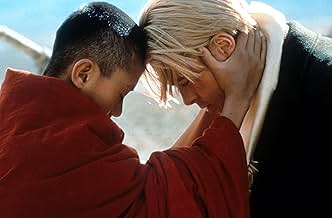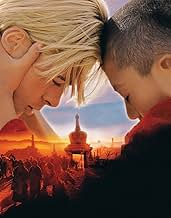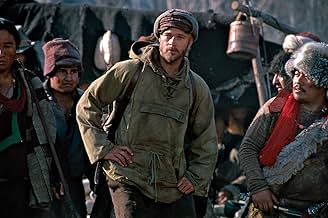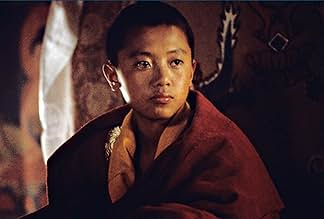La storia vera di Heinrich Harrer, uno scalatore di montagne austriaco che stringe amicizia con il Dalai Lama ai tempi dell'occupazione del Tibet da parte della Cina.La storia vera di Heinrich Harrer, uno scalatore di montagne austriaco che stringe amicizia con il Dalai Lama ai tempi dell'occupazione del Tibet da parte della Cina.La storia vera di Heinrich Harrer, uno scalatore di montagne austriaco che stringe amicizia con il Dalai Lama ai tempi dell'occupazione del Tibet da parte della Cina.
- Premi
- 3 vittorie e 8 candidature totali
BD Wong
- Ngawang Jigme
- (as B.D. Wong)
Ngawang Chojor
- Lord Chamberlain
- (as Ven. Ngawang Chojor)
Recensioni in evidenza
A movie is by definition a fictional tale. It may be based - more or less loosely - on real events, but it is still a fiction.
This part seems to have escaped many "reviewers" as it always does when a movie is based on "real events". In real life there are long periods when nothing exciting or interesting happens, but a movie cannot follow a character 24/7 in his daily life, even if that life takes place in Tibet.
This story is very loosely based on the experience of Austrian climber Heinrich Harrer, who embarked on a climbing expedition on the brink on WWII and ended up as POW in a British camp in India, for most of the war.
Having no reason to go back to Austria, he then ended up in Tibet where he met and became tutor to the 14th Dalai Lama. His adventure ended with the Chinese invasion of Tibet. That's it and it is already quite a lot.
The plot is a journey of discovery, not only geographical but also psychological. Thanks to his experience, Harrer turns from selfish, arrogant and uncaring into a gentler human being.
According to those who read Harrer account of his story, the film takes a lot of liberties, inventing episodes that - for me - are just supposed to make the story more cohesive. Also, I did not care much about Harrer involvement with the Nazi party, for which he apologised and that clearly was not the core of his existence.
Finally, for those who protest because the movie does not explore Tibetan culture, once more this is based on Harrer's tale, from is point of view. You want to know Tibetan history and Buddhist culture? There are thousand of non-fictional books and documentaries to fulfil this purpose.
This part seems to have escaped many "reviewers" as it always does when a movie is based on "real events". In real life there are long periods when nothing exciting or interesting happens, but a movie cannot follow a character 24/7 in his daily life, even if that life takes place in Tibet.
This story is very loosely based on the experience of Austrian climber Heinrich Harrer, who embarked on a climbing expedition on the brink on WWII and ended up as POW in a British camp in India, for most of the war.
Having no reason to go back to Austria, he then ended up in Tibet where he met and became tutor to the 14th Dalai Lama. His adventure ended with the Chinese invasion of Tibet. That's it and it is already quite a lot.
The plot is a journey of discovery, not only geographical but also psychological. Thanks to his experience, Harrer turns from selfish, arrogant and uncaring into a gentler human being.
According to those who read Harrer account of his story, the film takes a lot of liberties, inventing episodes that - for me - are just supposed to make the story more cohesive. Also, I did not care much about Harrer involvement with the Nazi party, for which he apologised and that clearly was not the core of his existence.
Finally, for those who protest because the movie does not explore Tibetan culture, once more this is based on Harrer's tale, from is point of view. You want to know Tibetan history and Buddhist culture? There are thousand of non-fictional books and documentaries to fulfil this purpose.
Personally, I find it hard to believe this movie is rated so lowly. It is at least a 7.5 in my books. Its far from perfect, but how many films out there actually question your beliefs and your actions and allows you to reflect on how you can live your life better? How many films make you want to know more about the film, the location, the people, the characters? Trust me, this film will make you more inquisitive and curious and probably open your eyes to the world beyond your borders.
Again, it is far from perfect, but watch it and try to see where I'm coming from. If you do not share my sentiments then, at least Brad Pitt's excellent acting and the gorgeous cinematography will keep your interest.
Again, it is far from perfect, but watch it and try to see where I'm coming from. If you do not share my sentiments then, at least Brad Pitt's excellent acting and the gorgeous cinematography will keep your interest.
"Seven Years in Tibet" was a pleasant surprise. Sporting an Austrian accent that got slammed by some critics, I thought Brad Pitt was pretty good as an arrogant Nazi who finds himself captured by the British during a failed expedition to the Himalayas and is later stranded in Tibet after escaping from a POW camp. He finds his humanity in the forbidden-to-foreigners city of Lhasa, especially after meeting the 14 year old Dalai Lama. Echoes of "Lost Horizon," "The King and I" "Last Emperor" and others abound, but the movie is "old Hollywood" in the best sense with magnificent scenery (widescreen advised: the mountains and countryside of Argentina and Canada stand in for Tibet). The heart of the movie is the relationship between the blond Aryan golden boy and the young "Kundun," with a performance by the young Tibetan actor playing the latter that is so charming he nearly steals the whole film. An engrossing blend of fact and fiction, the picture manages to avoid condescending to the Tibetans and over-reverent preachiness. Wrapped in an excellent production, this epic story makes entertaining viewing. One question: how did the young Dalai Lama come by his love of movies in that remote location?
I saw this film for the first time last night after hearing a great many people recommend it to me. I don't know why I waited so long! This is a soul stirring movie that is perfect in its simplicity. I don't think it's the best performance Brad Pitt has ever offered, but he was quite good. David Thewlis (an amazing actor who never receives as much praise he deserves) gave a perfect performance. But the real beauty of the film is the Tibetan people and their lifestyle. The cinematography was breathtaking and perfectly matched the mood of the film. I loved this movie so much that I'm going to buy it immediately. I love uplifting epic types of movies and this is truly one of the better ones I've seen in a while. In fact, it's one the better movies I've seen in a while.
It's too bad that the movie had to be 139 minutes long. It's not that I can't handle movies that are that long, but when watching longer movies, I expect that it has something to say during that extra time and that's where it sometimes went wrong with "Seven Years in Tibet". It just seemed to keep dragging on forever without contributing to the story.
It needs about 2/3 of the time to show what a bad guy Heinrich Harrer actually is and only 1/3 of the time to show how he changes and gradually becomes a good man. All he thinks about is his career as a mountain climber. In 1939, just before World War II, his wife is pregnant with their first child. Harrer doesn't want to take up his responsibility and 'flees' from her by going to Tibet, where he will try to conquer Mount Nanga Parbat in the Himalayas. Because he is an Austrian and because the Nazi's already have taken over power in Austria, they will use his successes to prove that the Germans are the best race (I hope I don't have to explain the entire Nazi ideology to you, but that you paid enough attention during history class). During his attempt to reach the summit he is arrested by the British and taken to a POW-camp. After several attempts to escape he finally succeeds and together with Peter Aufschnaiter he succeeds to reach Tibet. First he is his old, bad self, but gradually he changes his lifestyle and becomes more 'Tibetan'. He even knows to get the attention of the very young Dalai Lama and becomes friends with him during the period that the Chinese took over power in Tibet.
I don't know if all that is shown in this movie actually happened or to which extent some parts have been made up. Of course it is all a bit politically 'colored' (the Tibetan question is still not solved until today and so there will always be people who will choose China's side and say that what is shown here is completely wrong), but that doesn't mean that this movie doesn't carry a powerful message. But even without this message of being a good husband and not being a career driven jerk, the philosophical Tibetan approach to problems... this movie is very nice eye candy. The landscapes are absolutely stunning and Tibet really looks like a place that certainly is worth a visit. The acting is very good and it all looks very believable.
So despite the fact that this movie dragged on from time to time and that it should have been a bit shorter, this still is a very nice film. I give it a 7/10, perhaps even a 7.5/10.
It needs about 2/3 of the time to show what a bad guy Heinrich Harrer actually is and only 1/3 of the time to show how he changes and gradually becomes a good man. All he thinks about is his career as a mountain climber. In 1939, just before World War II, his wife is pregnant with their first child. Harrer doesn't want to take up his responsibility and 'flees' from her by going to Tibet, where he will try to conquer Mount Nanga Parbat in the Himalayas. Because he is an Austrian and because the Nazi's already have taken over power in Austria, they will use his successes to prove that the Germans are the best race (I hope I don't have to explain the entire Nazi ideology to you, but that you paid enough attention during history class). During his attempt to reach the summit he is arrested by the British and taken to a POW-camp. After several attempts to escape he finally succeeds and together with Peter Aufschnaiter he succeeds to reach Tibet. First he is his old, bad self, but gradually he changes his lifestyle and becomes more 'Tibetan'. He even knows to get the attention of the very young Dalai Lama and becomes friends with him during the period that the Chinese took over power in Tibet.
I don't know if all that is shown in this movie actually happened or to which extent some parts have been made up. Of course it is all a bit politically 'colored' (the Tibetan question is still not solved until today and so there will always be people who will choose China's side and say that what is shown here is completely wrong), but that doesn't mean that this movie doesn't carry a powerful message. But even without this message of being a good husband and not being a career driven jerk, the philosophical Tibetan approach to problems... this movie is very nice eye candy. The landscapes are absolutely stunning and Tibet really looks like a place that certainly is worth a visit. The acting is very good and it all looks very believable.
So despite the fact that this movie dragged on from time to time and that it should have been a bit shorter, this still is a very nice film. I give it a 7/10, perhaps even a 7.5/10.
Lo sapevi?
- QuizJetsun Pema is the real-life sister of The Dalai Lama. In this film she plays the mother of The Dalai Lama and hence her own mother.
- BlooperThe movie depicts the Dalai Lama's coronation occurring after Germany surrenders in WWII and after China invades Tibet. The actual enthronement ceremony took place on 22 February 1940, (Iron-Dragon Year, 1st month, 14th day), long before the end of the war and the Chinese invasion. On 17 November 1950, the Dalai Lama assumed full temporal (political) power over Tibet which was more than 10 years after his enthronement ceremony.
- Citazioni
Dalai Lama: We have a saying in Tibet: If a problem can be solved there is no use worrying about it. If it can't be solved, worrying will do no good.
- Curiosità sui creditiAs the end credits roll, a view of the mountains of Tibet is seen.
- Colonne sonorePurification Et Benediction
Performed by Monks of Namgyal Monastere
I più visti
Accedi per valutare e creare un elenco di titoli salvati per ottenere consigli personalizzati
Dettagli
- Data di uscita
- Paese di origine
- Sito ufficiale
- Lingue
- Celebre anche come
- Siete Años en el Tíbet
- Luoghi delle riprese
- Aziende produttrici
- Vedi altri crediti dell’azienda su IMDbPro
Botteghino
- Budget
- 70.000.000 USD (previsto)
- Lordo Stati Uniti e Canada
- 37.957.682 USD
- Fine settimana di apertura Stati Uniti e Canada
- 10.020.378 USD
- 12 ott 1997
- Lordo in tutto il mondo
- 131.457.682 USD
- Tempo di esecuzione
- 2h 16min(136 min)
- Colore
- Mix di suoni
- Proporzioni
- 2.39 : 1
Contribuisci a questa pagina
Suggerisci una modifica o aggiungi i contenuti mancanti



































